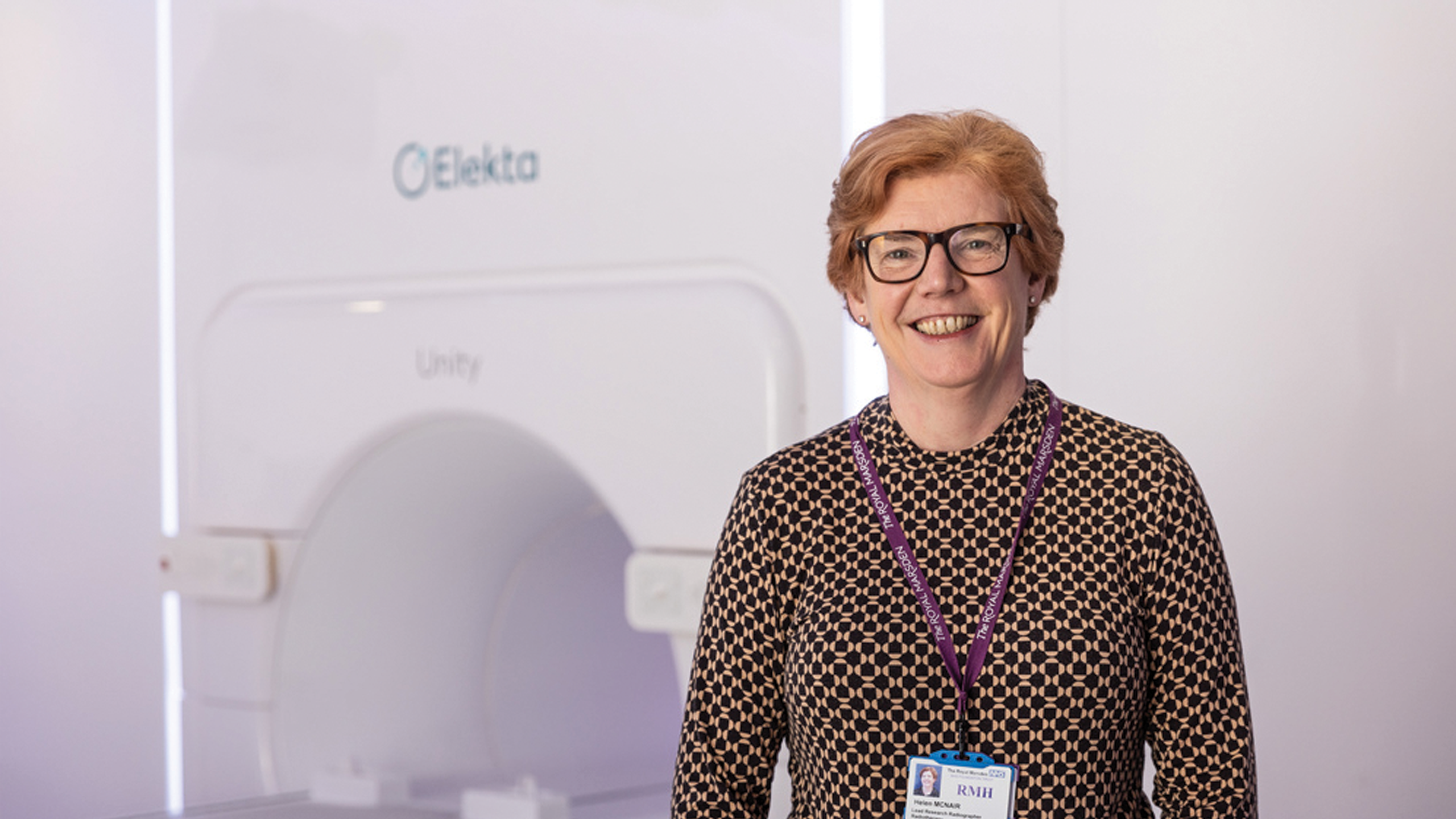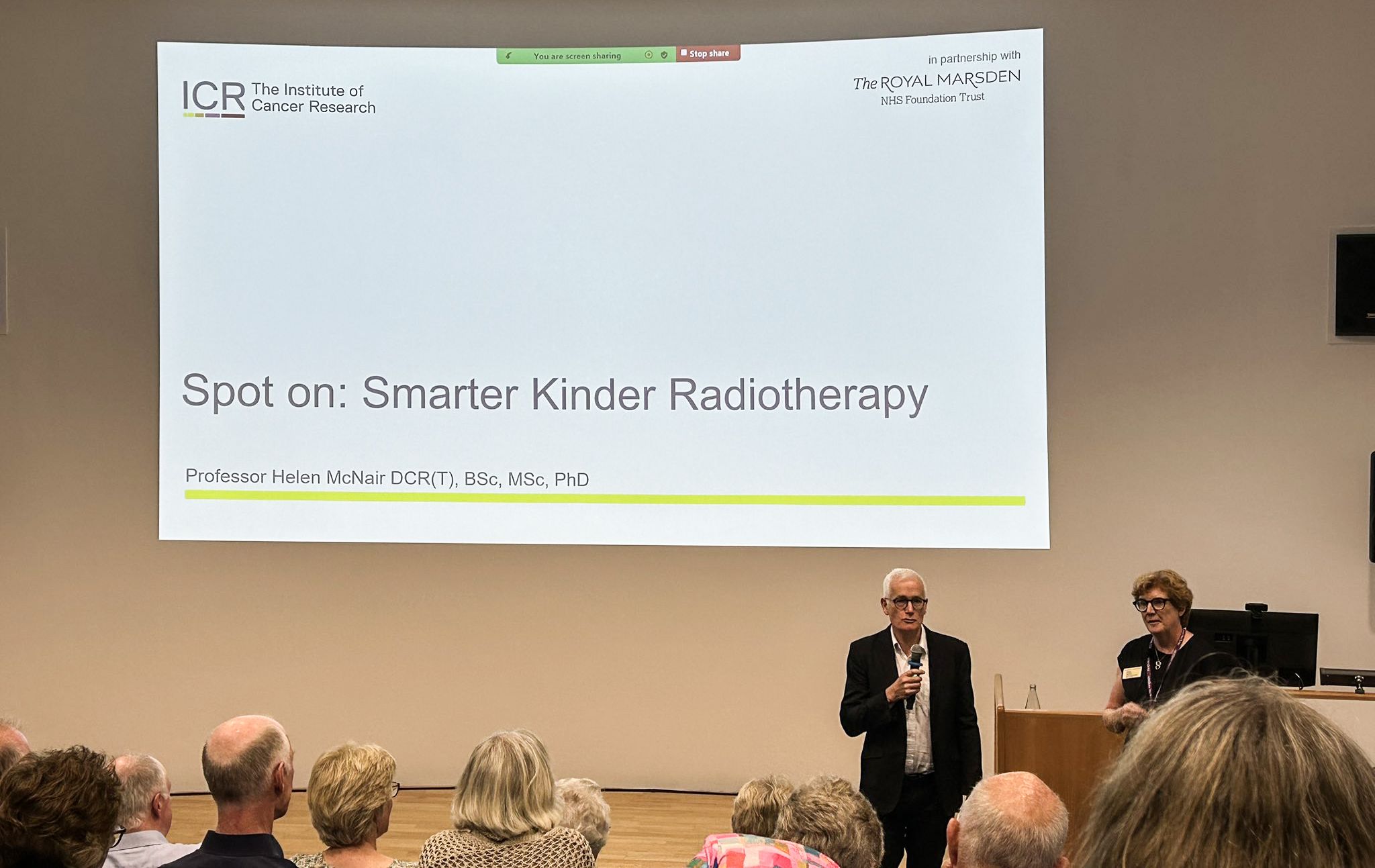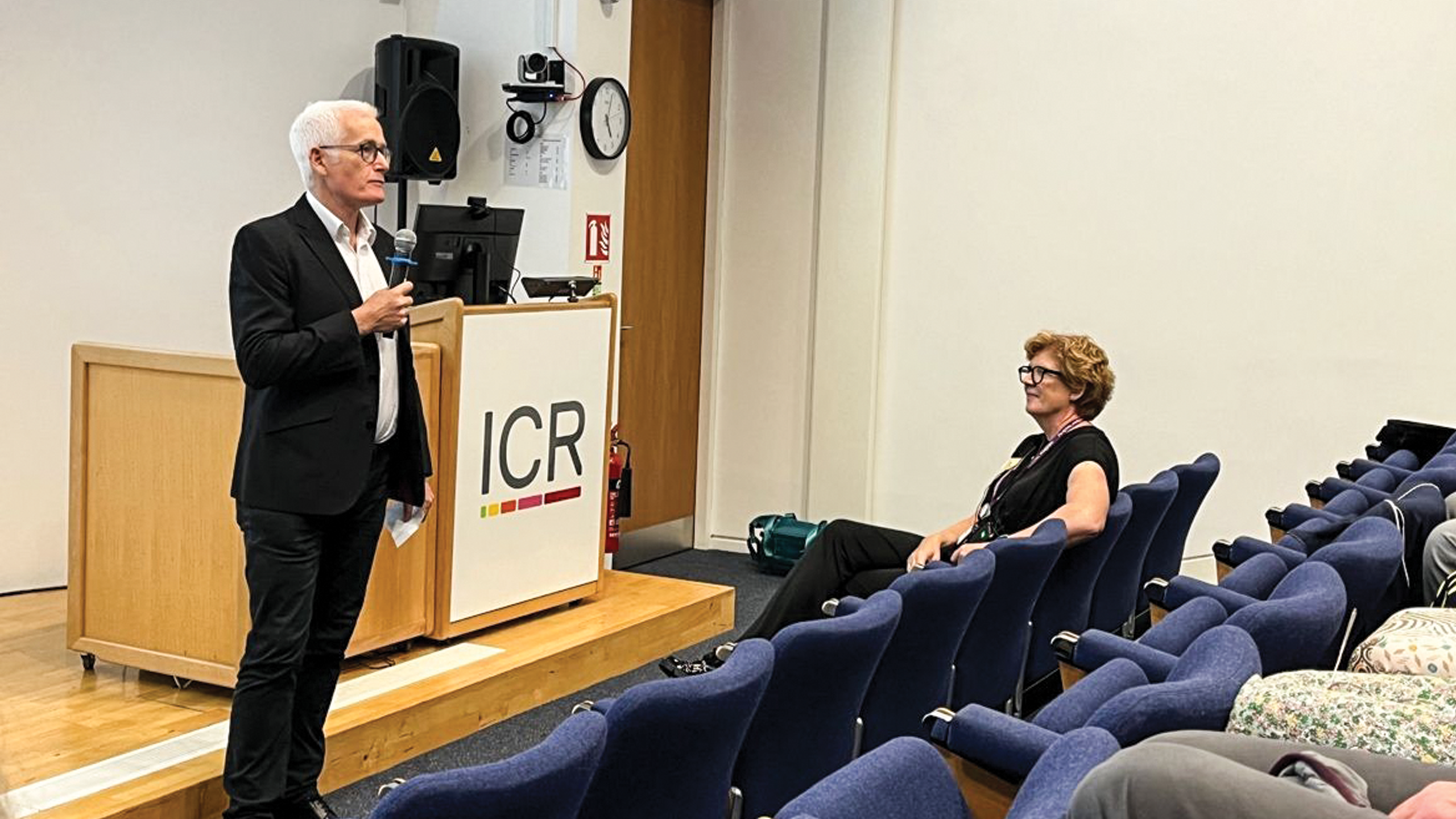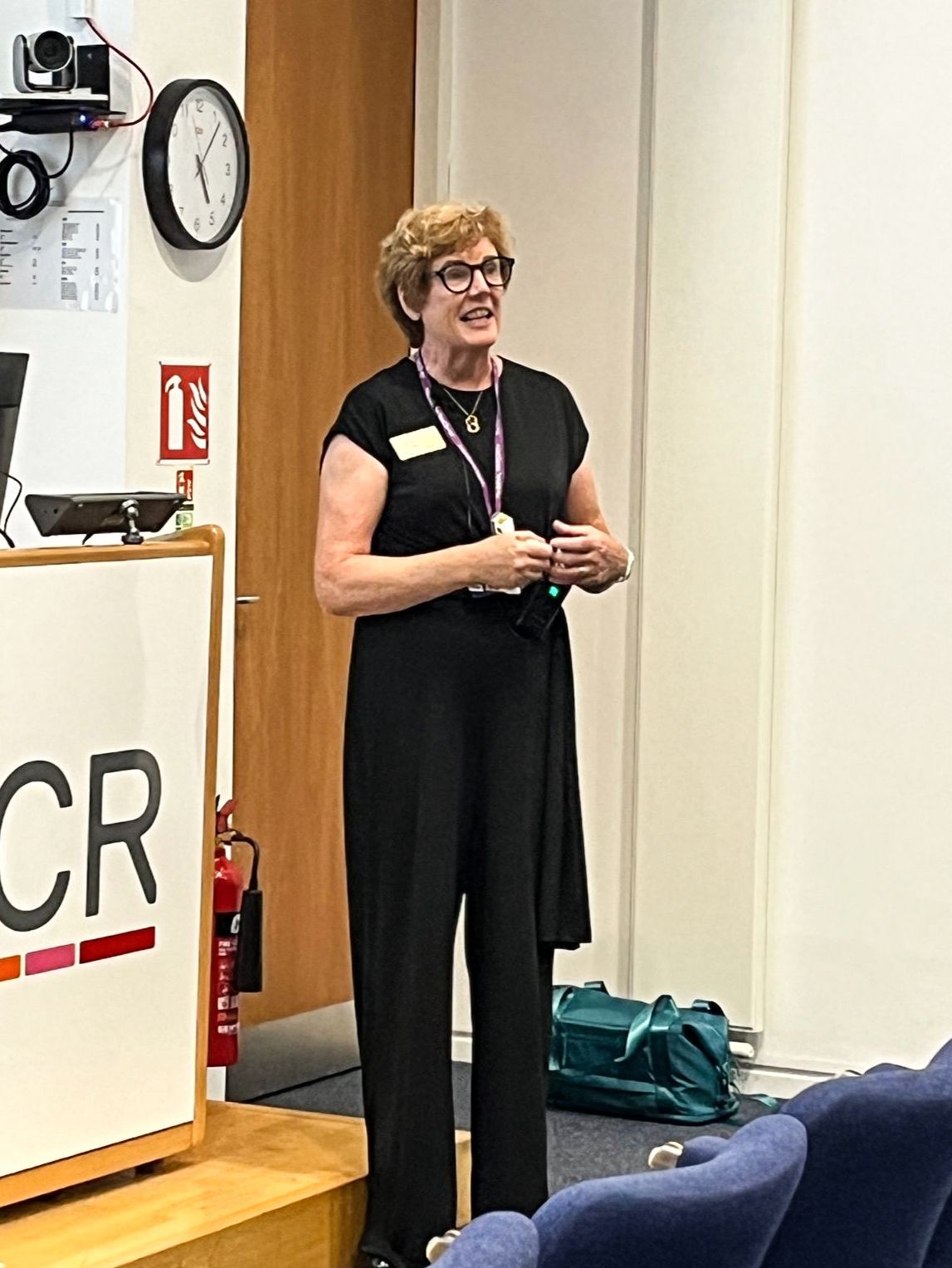Profile: Professor Helen McNair
‘Never give up’ – Helen McNair’s journey to professor
Clinical academic radiographer Helen McNair recently completed her inaugural lecture as a professor of translational therapeutic radiography, marking a lifetime of achievement in the profession
By Will Phillips

Profile: Professor Helen McNair
‘Never give up’ – Helen McNair’s journey to professor
Clinical academic radiographer Helen McNair recently completed her inaugural lecture as a professor of translational therapeutic radiography, marking a lifetime of achievement in the profession
By Will Phillips

In a packed lecture theatre at the Institute of Cancer Research, Professor Helen McNair is celebrating an achievement years in the making. After decades in radiography and research, Helen has finally become a professor, an achievement marked by a strenuous process of rigorous evaluation – not to mention the mountain of papers that needed publishing.
Delivering a talk to a room wall-to-wall with Helen’s colleagues, professional peers and her family and friends, Helen took attendees on a journey from her beginnings in Northern Ireland to her current position as an internationally recognised researcher at the Institute of Cancer Research.
Many hurdles
“Do the things you enjoy in your work and, if you stop enjoying it, try and change what you’re doing,” she tells Synergy. “I loved the clinical job for a long time, and then I was just finding it quite frustrating and overwhelming. I switched to the research job and got a new lease of life.
“Follow your gut feeling, and talk to people. If you’re not sure what you’re going to do, talk to people. It’s quite easy to look at somebody like me and think: ‘I could never do that’ – there’s been so many hurdles to overcome. But if you want to do something different, and you’re among the first to do it, it’s going to be like that. Don’t give up. Just keep going.”
On Thursday 5 September at the Institute of Cancer Research in Sutton, London, Kevin Harrington, professor of biological cancer therapies at the institute, opened Helen’s inaugural lecture by welcoming the guests, and spoke warmly of her achievement, celebrating her commitment, tenacity and hard work.
The lecture, entitled ‘Spot on: Smarter Kinder Radiotherapy’, followed Helen from Belfast’s Northern Ireland School of Therapeutic Radiography to her years in Australia and her move to The Royal Marsden NHS Foundation Trust. It featured Helen’s shift from clinical radiography to research, her PhD work and her research grant with Health Education England (HEE)/the National Institute for Health and Care Research (NIHR). Perhaps most importantly, it covered her hard work and incredible achievements.
Synergy sat down with Helen to find out more about the obstacles she has faced over the years to reach her prestigious title, how she has helped to support and deliver care for cancer patients, and how her involvement in research and within the multidisciplinary team has enabled services across the country to deliver more targeted radiotherapy and reduced side effects.

Translational therapeutic radiography
Helen McNair is a professor of translational therapeutic radiography at the Institute of Cancer Research. She previously held a HEE/NIHR senior clinical lecturer grant (2014-19) and works as lead clinical academic radiographer in the radiotherapy department at The Royal Marsden.
“It’s still sinking in a year later,” Helen admits on receiving her professorship. “The inaugural lecture helped, because that’s supposed to be a celebration. It takes time to organise, it’s normally held a year after you become a professor and it was a fantastic occasion. I had all my family there, all my seven brothers and sisters, lots of old colleagues, lots of current colleagues and people who supported me in my personal life as well.”
But what, Synergy asks, does her area of expertise actually mean? Translational therapeutic radiography is the practice of turning novel technology and theory into practice. Radiographers sit at the intersection of patients and technology. Where they meet, radiographers are there to mediate the connection – and ensuring that connection goes smoothly can make the difference between a positive and a negative patient experience. “We’re the only profession that’s qualified to deliver radiotherapy, so we deal with the patients and the technology,” says Helen. “How we implement new techniques is extremely important.”
Asking questions is at the core of research, and Helen’s area of expertise specifically asks whether the way technology is being used is as good as it can be. “What’s the most efficient, effective way of doing that?” she asks. “How do we train the staff? What about the patient experience? What do they think about the new techniques? Is there any patient training, or patient compliance, that has to be considered? They might have to be on the bed for longer, they might have to hold their breath – do these things help with the technology?”
Other projects Helen has worked on include the breath-hold technique for breast cancer patients, used to create a space between a patient’s heart and the radiotherapy to reduce potential damage to the heart. She was part of the multidisciplinary team that rolled the technique out around the UK.
“Follow your gut feeling, and talk to people. If you’re not sure what you’re going to do, talk to people"

The journey towards research
Helen first moved from clinical radiography to research in 2000, when she applied for a job as a research radiographer under a Cancer Research UK (CRUK) grant held by principal investigators at The Royal Marsden and the Institute of Cancer Research. Her work there focused on implementing Intensity-Modulated Radiotherapy – a type of radiotherapy that shapes the radiation beams to closely fit the area of cancer. “At the beginning, it was defining any barriers to implementation and suggesting ways to overcome these, helping people bridge that gap,” she says. “We’ve got this new technology, but it takes a lot of effort to start using it. I was involved in creating the guidelines in the UK.”
In April 2019, Helen was awarded her HEE/NIHR senior clinical lectureship, where she researches the delivery of radiotherapy using real-time treatment planning by redeploying the radiotherapy workforce to create an optimal patient pathway. Her clinical work involves working on an MRI Linac, a combination radiotherapy and MRI machine that allows treatment to be adapted every day.
She also co-chaired a subgroup of the National Cancer Action Team National Radiotherapy Implementation Group, which published the report ‘Image Guided Radiotherapy – Guidance for Implementation and Use’ in 2012, and its update in 2020. Helen also teaches on international courses ran by the European Society for Radiotherapy and Oncology (ESTRO); for example, Image-guided Radiotherapy and Magnetic Resonance-guided Radiotherapy.
Research is more than just a job for Helen, though – the radiography profession has become something special. “I really enjoy the multidisciplinary aspect of what I do: approaching a problem in a team, working alongside my clinical radiography colleagues and hearing the different aspects from each profession, clinical oncologists and physicians,” she says.
“I enjoy talking to the patients about a trial and seeing how the research leads to improvements in patient care. I also really like the variety and the fact that I continue to learn about new developments, teaching others and learning together how to improve the technology and/or workflows.
“With clinical, we treat 30 to 40 patients a day, and it’s clear when the day is finished. With research, it’s very different.
“What makes me most excited is seeing another radiographer doing a presentation at a conference for the first time. I just love the enthusiasm of my colleagues. It’s the people who make the difference. What a great profession, and a great community, we work in.”

‘No role models to follow’
Helen started her training 40 years ago, after an initial interest in physiotherapy. But when she stumbled across therapeutic radiography, she found a profession that allowed her to be with patients every day. “When I was at school, I didn’t really hear about radiographers,” she says. “We’re not very good at talking about what we do, even now. I was good at science, so physiotherapy seemed to be a reasonable fit, but it was very hard to get into in Northern Ireland. Then I saw radiography, and I liked the thought of that patient contact.”
Her first post was in Belfast, where she completed a diploma through hospital-based training at the Northern Ireland School of Therapeutic Radiography, finishing in 1986. After that, Helen took a post in Australia with a friend, where she stayed for two years. When she returned, Helen worked briefly for The Royal Marsden Hospital, before finding a permanent posting at Westminster Hospital in 1990. Helen joined The Royal Marsden NHS Foundation Trust in 1992, working both in clinical radiography and various research trials.
Her journey towards professorship began in 2000, when she applied for a job as a research radiographer. Despite a history of solely clinical work, Helen found the notion of getting involved with research “quite exciting”.
“I liked the thought of a change of direction,” she adds.
It was during this period of research work, where she was granted the opportunity to work across different research projects, that Helen thought about pursuing her own doctorate. Unfortunately, she was unable to secure separate funding to do so – but with the support of her senior research colleagues, she was able to finish her PhD part time, working under the CRUK grant, achieving her doctorate in 2011.
Doing her PhD part time was challenging, but it allowed her more time to recruit patients into trials. “I found it really difficult to keep going when things didn’t work out as I had expected, but it was incredibly rewarding when I realised that they did!” she says. “I also found writing my thesis very challenging initially; however, I was incredibly well supported by my academic supervisors.”
But post-doctoral opportunities were few and far between. Helen was blazing a path that few had followed before, and that left her somewhat in the lurch for what to do next. “It took me a long time to decide what to do next – no one else had really done this pathway,” she explains. “There was only one other Therapeutic Radiographer with a PhD in the country at that time. There were no role models to follow.”
Not only that but no allied health professionals held academic positions at the Institute of Cancer Research – Helen says it took her “quite a while to get on the rungs”. She became an associate professor in 2020, before finally achieving her professorship last year.
‘No role models to follow’
Helen started her training 40 years ago, after an initial interest in physiotherapy. But when she stumbled across therapeutic radiography, she found a profession that allowed her to be with patients every day. “When I was at school, I didn’t really hear about radiographers,” she says. “We’re not very good at talking about what we do, even now. I was good at science, so physiotherapy seemed to be a reasonable fit, but it was very hard to get into in Northern Ireland. Then I saw radiography, and I liked the thought of that patient contact.”
Her first post was in Belfast, where she completed a diploma through hospital-based training at the Northern Ireland School of Therapeutic Radiography, finishing in 1986. After that, Helen took a post in Australia with a friend, where she stayed for two years. When she returned, Helen worked briefly for The Royal Marsden Hospital, before finding a permanent posting at Westminster Hospital in 1990. Helen joined The Royal Marsden NHS Foundation Trust in 1992, working both in clinical radiography and various research trials.
Her journey towards professorship began in 2000, when she applied for a job as a research radiographer. Despite a history of solely clinical work, Helen found the notion of getting involved with research “quite exciting”.
“I liked the thought of a change of direction,” she adds.
It was during this period of research work, where she was granted the opportunity to work across different research projects, that Helen thought about pursuing her own doctorate. Unfortunately, she was unable to secure separate funding to do so – but with the support of her senior research colleagues, she was able to finish her PhD part time, working under the CRUK grant, achieving her doctorate in 2011.
Doing her PhD part time was challenging, but it allowed her more time to recruit patients into trials. “I found it really difficult to keep going when things didn’t work out as I had expected, but it was incredibly rewarding when I realised that they did!” she says. “I also found writing my thesis very challenging initially; however, I was incredibly well supported by my academic supervisors.”
But post-doctoral opportunities were few and far between. Helen was blazing a path that few had followed before, and that left her somewhat in the lurch for what to do next. “It took me a long time to decide what to do next – no one else had really done this pathway,” she explains. “There was only one other Therapeutic Radiographer with a PhD in the country at that time. There were no role models to follow.”
Not only that but no allied health professionals held academic positions at the Institute of Cancer Research – Helen says it took her “quite a while to get on the rungs”. She became an associate professor in 2020, before finally achieving her professorship last year.
"It’s the people that make the difference. What a great profession, and a great community, we work in”

‘Dedication to the profession’
Helen has since passed on much of her experience by mentoring and supervising radiographers doing research at The Royal Marsden and elsewhere.
Even with her national and international teaching courses, staying based in the radiotherapy department is very important, she adds. Doing so allows her to work closely with clinical colleagues, where they can bounce ideas off each other and critically appraise new developments.
Now that Helen is a professor, she says she’s looking forward to enjoying the next few years. She tells Synergy she would like to set up a team for succession planning, establishing the role and position of therapeutic radiography research at The Royal Marsden.
Charlotte Beardmore, executive director of professional policy at the Society of Radiographers, attended the lecture. She said: “On behalf of the Society of Radiographers I would like to offer the warmest of congratulations to Helen – we are very proud of you and your achievements. I would like to thank Helen for her dedication to the profession, and importantly to recognise that her research, and that of colleagues she is now supervising through the NIHR-funded work, is and will continue to evaluate how we can deliver the best possible care to patients.
“Thank you, Professor Helen McNair.”
More about Helen McNair
Helen McNair is the lead clinical academic radiographer at The Royal Marsden NHS Foundation Trust and a professor at the Institute of Cancer Research.
Her main area of research is implementing new radiotherapy technologies into clinical practice, focusing on Image-guided Radiotherapy and Magnetic Resonance Image-guided Radiotherapy.
Helen is a member of the teaching faculty of the ESTRO Magnetic Resonance Image-guided Radiotherapy course and a Fellow of the British Institute of Radiology.
Read more





